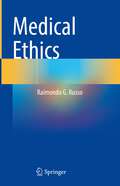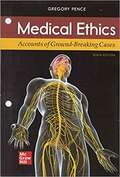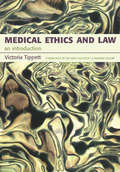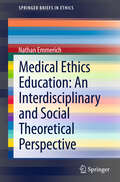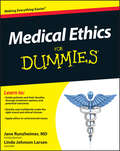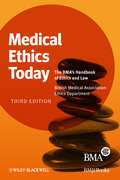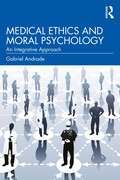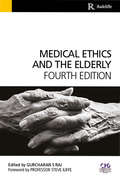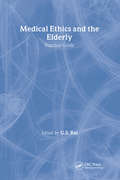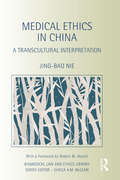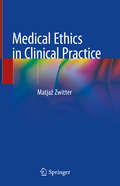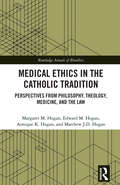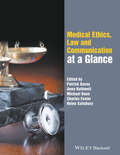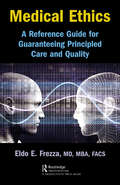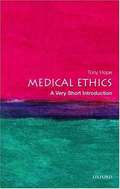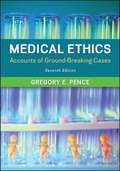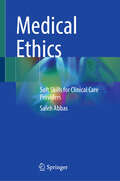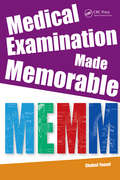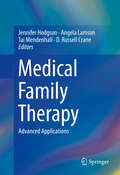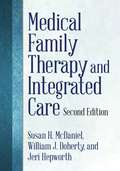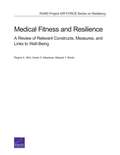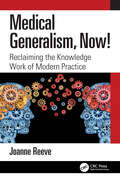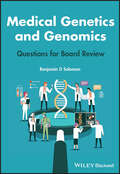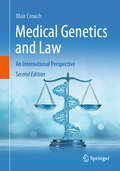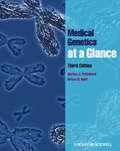- Table View
- List View
Medical Ethics
by Raimondo G. RussoMedical practitioners have always been expected to abide by certain standards of conduct and uphold certain values, more or less throughout the world. In this book, besides discussing specific ethical issues, the author ponders questions such as the right to life and the integrity of the human person. Ethics in medicine takes account of the principles that underlie the best decisions, particularly in unusual circumstances – such as a pandemic. Many of these are enshrouded in the oaths most doctors take – the Hippocratic Oath is perhaps the best known, and has influenced numerous others over the centuries. However, these principles and the resulting conduct have taken different directions at various moments in history and in different parts of the globe, though always primarily oriented to the protection of human health. The author compares some interesting similarities and differences, tracing the main social, legal and religious attitudes, in what has come to be known as"medical ethics", with all its benefits to Mankind. Alongside basic human dignity, four main values have been pivotal in medical ethics: Caring for sick people, putting their well-being at the center of concern, and doing good. Not causing harm: never making a patient take risks, and never prescribing a doubtful treatment. Fairness: treating all patients in accordance with their health needs, never favoring or neglecting anyone on the basis of background, occupation, etc. Self-determination: the patient can be informed about treatments and, when possible, should approve the prescriptions. The doctor must show empathy, respect for confidentiality, and responsibility. Briefly, this overview of the medical profession’s ethics focuses on experience, principles, aims, virtues and above all the basic rules which in various places through the centuries have governed the tortuous paths of Mankind. Written byan acclaimed expert in the field, this book is of value for all those working in healthcare, and people interested in its ethics.
Medical Ethics Accounts Ground-Breaking Cases
by Gregory E. PenceMedical Ethics: Accounts of Ground-Breaking Cases | Ninth Edition
Medical Ethics And Law: An Introduction
by Victoria TippettThis book is to help you understand the main ethical and legal details you need to know in order to practice medicine safely and well. Medical ethics is an inherently fascinating subject, and throws up new issues every day. Good ethical thinking requires practice and application and there are essentials that are easy to grasp and learn quickly - this book will show you how. It contains short summaries, with examples, and guidance on your legal position, of a series of core topics of medical ethics and law. Its aim is to give you some guides to effective, safe and good clinical practice.
Medical Ethics Education: An Interdisciplinary and Social Theoretical Perspective
by Nathan EmmerichThere is a diversity of 'ethical practices' within medicine as an institutionalised profession as well as a need for ethical specialists both in practice as well as in institutionalised roles. This Brief offers a social perspective on medical ethics education. It discusses a range of concepts relevant to educational theory and thus provides a basic illumination of the subject. Recent research in the sociology of medical education and the social theory of Pierre Bourdieu are covered. In the end, the themes of Bourdieuan Social Theory, socio-cultural apprenticeships and the 'characterological turn' in medical education are draw together the context of medical ethics education.
Medical Ethics For Dummies
by Linda Johnson Larsen Jane RunzheimerA practical, insightful guide to the moral and ethical standards of healthcareSucceeding in the healthcare field means more than just making a diagnosis and writing a prescription. Healthcare professionals are responsible for convincing patients and their family members of the best course of action and treatments to follow, while knowing how to make the right moral and ethical choices, and so much more. Unlike daunting and expensive texts, Medical Ethics For Dummies offers an accessible and affordable course supplement for anyone studying medical or biomedical ethics.* Follows typical medical and biomedical ethics courses* Covers real ethical dilemmas doctors, nurses and other healthcare workers may face* Includes moral issues surrounding stem cell research, genetic engineering, euthanasia, and morePacked with helpful information, Medical Ethics For Dummies arms aspiring medical professionals with the philosophical and practical foundation for advancing in a field where critical ethical and moral decisions need to be rapidly and convincingly made.
Medical Ethics Today
by British Medical AssociationThis is your source for authoritative and comprehensive guidance from the British Medical Association (BMA) Medical Ethics Department covering both routine and highly contentious medico-legal issues faced by health care professionals. The new edition updates the information from both the legal and ethical perspectives and reflects developments surrounding The Mental Capacity Act, Human Tissue Act, and revision of the Human Fertilisation and Embryology Act.
Medical Ethics and Moral Psychology: An Integrative Approach
by Gabriel AndradeMedical Ethics and Moral Psychology: An Integrative Approach is a pioneering book which provides a comprehensive exploration of the ethical challenges in contemporary healthcare. Seamlessly combining insights from medical ethics and moral psychology, this interdisciplinary work illuminates critical issues that have become particularly relevant in recent times, especially in the context of culture wars.This integrative approach enables readers to gain a deeper understanding of how moral decision-making is influenced by cognitive biases, societal attitudes, and philosophical frameworks. The book meticulously examines the complexities of vaccine mandates, addressing psychological resistance and conspiracy theories, while discussing self-defense arguments in abortion debates and the cognitive dissonance surrounding fetal personhood. It further provides a balanced analysis of euthanasia by navigating the nuanced distinctions between killing and letting die, and it interrogates the ethical implications of Assisted Reproductive Technologies amidst the clash of technological advancement and traditional values.By highlighting issues of justice in healthcare resource distribution, including systemic racism and equity, this work also equips readers with the tools necessary to engage thoughtfully with contemporary ethical dilemmas and the moral psychology aspects that contextualize them, fostering informed decision-making and the development of just healthcare policies with greater sensitivity and depth.Drawing on insights from psychology, sociology, anthropology and history to offer a comprehensive understanding of the complex dynamics shaping medical ethical decision-making, this is ideal reading for students and researchers in moral psychology, medical ethics, philosophy and public health. It is also designed for healthcare professionals, ethicists and policymakers.
Medical Ethics and the Elderly
by Gurchuran RaiThe Fourth Edition of this bestselling, highly regarded book has been fully revised to incorporate changes in law and clinical guidance making a vital impact on patient management, encompassing: . The Equality Act 2010 which provides the right of older people to treatment without discrimination . Case law on withdrawing nutrition and hydration . Up
Medical Ethics and the Elderly: practical guide
by Gurcharan S RaiThis concise, introductory handbook discusses the basic principles of medical ethics, and includes practical, realistic guidance on how to evaluate and manage common ethical problems, focusing on the care of elderly patients Typical scenarios faced in clinical practice, such as issues of mental capacity and consent, resuscitation, near death decisions, quality of life, and health care expenditure, are discussed
Medical Ethics in China: A Transcultural Interpretation (Biomedical Law and Ethics Library)
by Jing-Bao NieDrawing on a wide range of primary historical and sociological sources and employing sharp philosophical analysis, this book investigates medical ethics from a Chinese-Western comparative perspective. In doing so, it offers a fascinating exploration of both cultural differences and commonalities exhibited by China and the West in medicine and medical ethics. The book carefully examines a number of key bioethical issues in the Chinese socio-cultural context including: attitudes toward foetuses; disclosure of information by medical professionals; informed consent; professional medical ethics; health promotion; feminist bioethics; and human rights. It not only provides insights into Chinese perspectives, but also sheds light on the appropriate methods for comparative cultural and ethical studies. Through his pioneering study, Jing-Bao Nie has put forward a theory of "trans-cultural bioethics," an ethical paradigm which upholds the primacy of morality whilst resisting cultural stereotypes, and appreciating the internal plurality, richness, dynamism and openness of medical ethics in any culture. Medical Ethics in China will be of particular interest to students and academics in the fields of Medical Law, Bioethics, Medical Ethics, Cross-Cultural Ethics as well as Chinese/Asian Studies and Comparative Cross-Cultural Studies.
Medical Ethics in Clinical Practice
by Matjaž ZwitterThis book discusses medicine from an ethical perspective, whereas books on medical ethics more commonly present ethics from a bio-medical standpoint. The book is divided into 23 chapters. The introductory chapters present some basic concepts of medical ethics, such as the relation between the legal system and ethics, ethical documents, ethical theories, and ethical analysis. The following chapters address issues of importance in all fields of medicine: respecting autonomy, communication, relations within a healthcare team, professional malpractice, limited resources, and the portrait of a physician. In turn, the third part of the book focuses on ethical aspects in a broad range of medical activities – preventive medicine, human reproduction, genetics, pediatrics, intensive care, palliative medicine, clinical research, unproven methods in diagnostics and treatment, and the role of physicians who aren’t directly responsible for patient care. The last part presents students’ seminars with case stories. The book offers a valuable resource for physicians of all specialties, students of medicine, professionals, and students from other fields devoted to human health, journalists, and general readers with an interest in medicine.
Medical Ethics in the Catholic Tradition: Perspectives from Philosophy, Theology, Medicine, and the Law (Routledge Annals of Bioethics)
by Margaret M. Hogan Edward M. Hogan Annique K. Hogan Matthew J.D. HoganThis book is a comprehensive survey and a sustained treatment of the major topics in contemporary medical ethics from within the Roman Catholic tradition. It brings together perspectives from philosophy, theology, medicine, and law to explore the traditions that undergird Catholic medical ethics.The authors of this book are, respectively, a philosopher, theologian, physician, and attorney. Their commitment to the Roman Catholic tradition provides the foundational principles for addressing a wide range of issues in contemporary medical ethics. These topics include abortion, reproduction, cloning to produce children, cloning for biomedical research, embryonic stem cell use, genetics as screening, testing, therapy, enhancement, engineering, specific special relations such as maternal/fetal, physician/patient, mentally ill/caretakers, health care, and end of life issues. Furthermore, the book elaborates on the ways in which the authors’ professions and disciplines act in service to medicine as an instrument for real human flourishing.Medical Ethics in the Catholic Tradition is for the physician who would like to know more about the philosophical/theological/legal traditions that undergird the Catholic position. It is for the attorney who would like to know more about the philosophical/theological/medical traditions that undergird the Catholic position. Similarly, the philosopher or theologian can find here the appropriate information to understand how science and law contribute to the development of the Catholic position on major issues in medical ethics.
Medical Ethics, Law and Communication at a Glance
by Charles Foster Michael Dunn Patrick Davey Anna Rathmell Helen SalisburyMedical Ethics, Law and Communication at a Glance presents a succinct overview of these key areas of the medical curriculum. This new title aims to provide a concise summary of the three core, interlinked topics essential to resolving ethical dilemmas in medicine and avoiding medico-legal action. Divided into two sections; the first examines the ethical and legal principles underpinning each medical topic; while the second focuses on communication skills and the importance of good communication. Medical Ethics, Law and Communication at a Glance offers an accessible introduction to the fundamentals of good medical practice, and will provide indispensable support for undergraduate medical students and nurses, as well as newly qualified healthcare professionals.
Medical Ethics: A Reference Guide for Guaranteeing Principled Care and Quality
by Eldo FrezzaMedical ethics is a system of moral principles that apply values to the practice of clinical medicine and in scientific research. Medical ethics allow for people, regardless of background, to be guaranteed quality and principled care. It is based on a set of values that professionals can refer to in the case of any confusion or conflict. These values include the respect for autonomy, non-maleficence, beneficence, and justice. These tenets allow doctors, care providers, and families to create a treatment plan and work towards the same common goal without any conflict. Succeeding in the healthcare field means more than just making a diagnosis and writing a prescription. Healthcare professionals are responsible for convincing patients and their family members of the best course of action and treatments to follow, while knowing how to make the right moral and ethical choices. Ethical teaching should be an active part of training and should be taught in four division: basic ethics, clinical ethics, legal principles related to ethics and the ethics of research and affiliation. This book is a reference guide for physicians, healthcare providers and administrative staff. It looks at the ethical problems they face every day, gives the background and the ethical problem and then provides practical advice which can be easily implemented. This book provides the knowledge needed to understand who has the right to healthcare, the justice of clinical practice, what autonomy means for a patient giving consent, who is going to make any surrogate decisions and more.
Medical Ethics: A Very Short Introduction
by Tony HopeMedical ethics is an area that has particular interest for the general public as well as for the medical practitioner, and issues concerning medical ethics seem to be constantly in the headlines. This short and accessible introduction provides an invaluable tool with which to think about the ethical values that lie at the heart of medicine. Tony Hope deals with thorny moral issues, including euthanasia and the morality of killing. He also explores political questions, such as how we can make sure health care resources are distributed fairly. Each chapter in the book considers a different issue, for example, genetics, modern reproductive technologies, resource allocation, mental health, and medical research. Each section also discusses controversial questions such as: Who should have access to reproductive technology? Is it right to fund expensive drug treatment for individuals? Should treatment for mental illness be imposed on patients without their consent? Considering a wide range of questions of medical ethics, this Very Short Introduction will help to explain some of the confusing issues facing the field of medicine today.
Medical Ethics: Accounts of Groundbreaking Cases (Seventh Edition)
by Gregory E. PenceGregory Pence helped found the Bioethics field and has published in this area for forty years. In this text his single, authorial voice integrates descriptions of some of the most famous bioethics cases and their issues. The text is the only one that follows cases over decades to tell readers what did, and often, what did not, happen. This new edition retains in-depth discussion of famous cases, while providing updated, detailed analysis of newly raised issues.
Medical Ethics: Soft Skills for Clinical Care Providers
by Saleh AbbasThis book provides a comprehensive exploration of medical ethics, focusing on the essential soft skills required for clinical care providers. It bridges the gap between philosophical principles and practical application, offering a clear and accessible guide to navigating ethical dilemmas in healthcare. Readers will uncover key concepts such as autonomy, beneficence, and justice, alongside practical discussions on informed consent and biomedical research. The chapters explore into the philosophical underpinnings of ethics, examining moral theory and moral status, while emphasizing the importance of communication skills in clinical settings. The book also addresses critical issues like informed consent and the ethical considerations in biomedical research. By emphasizing communication skills, it highlights the importance of effective interaction between clinicians and patients, ensuring ethical practice is maintained in all aspects of care. This book is a must-read for those seeking to enhance their understanding of ethical practice in medicine, offering insights from experienced practitioners and scholars. Ideal for healthcare professionals, medical students, and scholars of medical ethics, this book equips readers with the tools to apply ethical principles in real-world scenarios. Readers will gain valuable insights into the moral complexities of patient care. It invites readers to consider the ethical dimensions of their work and offers practical strategies for addressing complex moral dilemmas.
Medical Examination Made Memorable: Integrating Everything, Book 4
by Anthony Culyer Yousaf ShahedExamination is an area of medical practice which requires much factual, diagnostic and procedural knowledge to be committed to memory: this in itself can be a challenging feat. Medical Examination Made Memorable puts research on learning and memorising techniques into action, presenting medical examination in a unique, enjoyable and easy-to-learn format. Health conditions are linked to well-known people, and specially drawn images - often deliberately bizarre or exaggerated to make them more memorable - are included throughout. Information is broken down into easily recallable chunks, and mnemonics (which may not suit all learning styles) are only included where especially clear or useful. Discussing information with others stimulates the aural component of memory, and practicing physical skills leads to kinaesthetic memorisation (muscle memory): the book also takes these vital learning techniques into account. Medical Examination Made Memorable is a vital reference and aide-memoire for students and practitioners at all levels and in all specialisms.
Medical Family Therapy
by Jennifer Hodgson Angela Lamson Tai Mendenhall D. Russell Crane"High praise to Hodgson, Lamson, Mendenhall, and Crane and in creating a seminal work for systemic researchers, educators, supervisors, policy makers and financial experts in health care. The comprehensiveness and innovation explored by every author reflects an in depth understanding that reveals true pioneers of integrated health care. Medical Family Therapy: Advances in Application will lead the way for Medical Family Therapists in areas just now being acknowledged and explored. " - Tracy Todd, PhD, LMFT, Executive Director of the American Association for Marriage and Family Therapy Integrated, interdisciplinary health care is growing in stature and gaining in numbers. Systems and payers are facilitating it. Patients and providers are benefitting from it. Research is supporting it, and policymakers are demanding it. The emerging field of Medical Family Therapy (MedFT) is contributing greatly to these developments and Medical Family Therapy: Advanced Applications examines its implementation in depth. Leading experts describe MedFT as it is practiced today, the continuum of services provided, the necessary competencies for practitioners, and the biological, psychological, social, and spiritual aspects of health that the specialty works to integrate. Data-rich chapters model core concepts such as the practitioner as scientist, the importance of context in health care settings, collaboration with families and communities, and the centrality of the relational perspective in treatment. And the book's wide-spectrum coverage takes in research, training, financial, and policy issues, among them: Preparing MedFTs for the multiple worlds of health care Extending platforms on how to build relationships in integrated care Offering a primer in program evaluation for MedFTs Ensuring health equity in MedFT research Identifying where policy and practice collide with ethics and integrated care Recognizing the cost-effectiveness of family therapy in health care With its sophisticated insights into the current state - and the future - of healthcare reform, Medical Family Therapy: Advanced Applications is essential reading for researchers and practitioners in the fields of clinical psychology, counseling, family therapy, healthcare policy, psychiatric nursing, psychiatry, public health, and social work.
Medical Family Therapy and Integrated Care (Second Edition)
by Susan H. Mcdaniel Jeri Hepworth William J. DohertyThe field of medical family therapy has grown by leaps and bounds since the authors' bestselling Medical Family Therapy: A Biopsychosocial Approach to Families With Health Problems was published in 1992. In that book, the authors sought to bridge the gap between mental and physical health by introducing a systems-based approach that unites unites physicians, psychologists, family therapists, social workers, nurses, counselors, and therapists of all theoretical orientations in working with families across a wide range of professional settings. In this thorough revision and update of their classic text, the authors describe the impact of recent economic and structural changes in health care on the role of the medical family therapist. They describe how medical and mental health providers can learn to speak the same language, whether they collaborate in outpatient therapy, co-location settings, community health centers, or fully-integrated health systems. They also take into account exciting new advances in fertility treatments and genomic medicine, and assess the medical family therapist's role in navigating the unique conflicts that can arise in families dealing with these and similar issues.
Medical Fitness and Resilience: A Review of Relevant Constructs, Measures, and Links to Well-Being
by Sarah O. Meadows Regina A. Shih Margret T. MartinThis report is one of a series designed to support Air Force leaders in promoting resilience among its Airmen, civilian employees, and Air Force families. It examines the relationship between medical fitness and resilience, using key constructs found in the scientific literature, which address preventive care, the presence and management of injuries and chronic conditions, and facilitators and barriers to access of appropriate health care.
Medical Generalism, Now!: Reclaiming the Knowledge Work of Modern Practice
by Joanne ReeveMedical Generalism, Now! is a unique and timely consideration of generalist medical practice. With a focus on the knowledge work of clinical practice and by taking a whole healthcare system view, the book responds to a recognized need to strengthen generalist practice within modern healthcare delivery in both primary and secondary care settings. Through a series of creative provocations directed to consulting clinicians and their trainers/educators, service leaders and managers, and policy makers, readers are encouraged to challenge the orthodox view that generalism is an outdated 'jack of all trades’ sub-set of clinical medicine delivering the ‘simpler’ aspects of medicine, with more complex issues requiring onward specialist referral. Case studies are used throughout to illustrate the challenges to be faced, accompanied by a description of the principles of generalist knowledge work needed to tackle the scenarios described and discussing the implications for practice and service redesign. Essential reading for clinicians, managers and policy makers across all healthcare settings, the book concludes with a call to action, synthesizing the learning from each chapter to define and describe delivery of the key changes needed.
Medical Genetics and Genomics: Questions for Board Review
by Benjamin D. SolomonMedical Genetics and Genomics A comprehensive question-and-answer book for those preparing for board examinations on clinical genetics Medical Genetics and Genomics: Questions for Board Review provides more than 350 high-yield multiple choice questions (MCQs) to help readers prepare for standardized examinations for accreditation and ongoing certification in the various fields of medical genetics and genomics, as well as other trainees and learners who want to understand more about the field. Written by a leading authority in clinical genetics with extensive teaching experience in academia, government, biotech, and in healthcare, this invaluable study aid covers essential terminology, clinical diagnosis and manifestations of specific conditions, laboratory and testing approaches, management of genetic conditions, and more. The questions are organized into thematic areas to help readers focus on specific areas within the field of genetics and genomics. Each section of questions is followed by fully annotated answers with concise explanations and up-to-date references. Throughout the book, high-quality illustrations are presented to enhance understanding of all key concepts. Contains more than 350 multiple choice questions covering multiple areas of genetics Provides clear and concise answers with brief and focused explanations Helpful for preparation for American Board of Medical Genetics and Genomics (ABMGG) and American Board of Genetic Counseling (ABGC) board examinations, as well as for general study of medical genetics and genomics Includes full references to scientific and medical articles, traditional textbooks, online articles, and other internet resources Medical Genetics and Genomics: Questions for Board Review is a must-have for clinical trainees, physicians, laboratory geneticists, genetic counselors, and allied health professionals working in medical genetics.
Medical Genetics and Law: An International Perspective
by Mair CrouchThis book is an essential resource to understanding the intersection of medical genetics and law. In a unique approach, it provides an overview on the biological principles of DNA basics and genetic inheritance linking the knowledge with the ethical and legal challenges presented by modern developments in genetics. The first chapters educate the reader in key concepts such as cell division, genetic inheritance, genome study methods, genetic screening and testing across various countries. It further expands into complex issues where regulation is required, in particular: controversial aspects of genetic modifications, ethical concerns around patient confidentiality and biobanks' role in linking genetic variation to complex diseases. It includes legal cases regarding negligence claims from conception to adulthood and reflects on the impact of present and future developments in genomics on the law. Readers will gain a deeper understanding of how developments in genetics impact individuals and society, helping them navigate this rapidly evolving field. Given the interdisciplinary approach, the book is suitable for both medical and law students, practicing lawyers, medical practitioners, and genetic counselors. It is particularly beneficial for those who deal with medical negligence and need to understand the genetic aspects of such cases.
Medical Genetics at a Glance
by Bruce R. Korf Dorian J. PritchardMedical Genetics at a Glance covers the core scientific principles necessary for an understanding of medical genetics and its clinical applications, while also considering the social implications of genetic disorders.This third edition has been fully updated to include the latest developments in the field, covering the most common genetic anomalies, their diagnosis and management, in clear, concise and revision-friendly sections to complement any health science course.Medical Genetics at a Glance now has a completely revised structure, to make its content even more accessible. Other features include: * Three new chapters on Gene Identification, The Biology of Cancer, and Genomic Approaches to Cancer* A much extended treatment of Biochemical Genetics* A completely revised chapter on The Cell Cycle, explaining principles of biochemistry and genetics which are fundamental to understanding cancer causation* Two new chapters on Cardiac Developmental Pathology* An extended Case Studies sectionProviding a broad understanding of one of the most rapidly progressing topics in medicine, Medical Genetics at a Glance is perfect for students of medicine, molecular biology, genetics and genetic counselling, and is a previous winner of a BMA Award.
